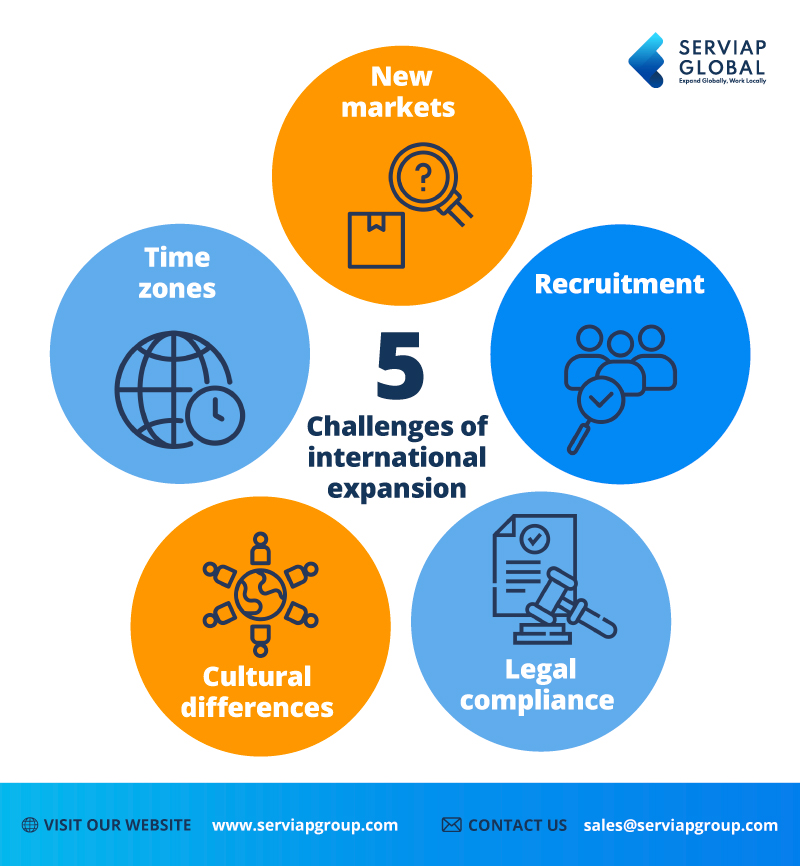Table of Contents
Establishing and operating in other parts of the world can attract companies looking to grow beyond their borders. The benefits are many, such as positioning in new markets, diversifying revenue sources, and accessing global talent. However, to succeed in this journey, companies must be aware of the challenges of international expansion.
Taking a business to other territories involves planning strategies, leveraging resources, and digitizing specific processes for communicating with employees and assigning and reviewing tasks, especially when looking to build a distributed workforce. For this reason, it is crucial to understand the challenges of international expansion and develop a plan that ensures a smooth transition from the domestic to the global market.
The pandemic affected all sectors and forced many to learn lessons such as how to adapt to change and explore opportunities. Thus, many business leaders adopted remote and hybrid work and offshored part of their operations, which represented savings for their companies and some benefits for employees.
SEE ALSO: Call center outsourcing: 5 great destinations to consider
Technology, marketing, social media, and different communication platforms have also helped companies in their global mobility programs, the ability of an organization’s employees to move anywhere and operate successfully. However, the challenges of international expansion go beyond having the right people performing in different regions.


The unfamiliarity of a new market, needing to decide whether to set up a subsidiary or outsource part of your operations, local tax and labor regulations, and even language and cultural differences are important things to consider when expanding other territories.
One way to overcome the challenges of international expansion is by acquiring the services of an employer of record (EOR). In addition to recruiting the best talent for their clients, an EOR understands the local market, the regulations, and the local and federal taxes.
SEE ALSO: Find great headhunters in Latin America in 7 steps
An EOR hires local personnel quickly and in compliance with the law. They also handle human resources issues such as payroll, insurance, and other benefits the employer must provide to its new employees. So, while the EOR is responsible for these administrative procedures, the client-company can focus on growing its business and not the challenges of international expansion.
When looking at these companies as a route to mitigate the challenges of international expansion, growing firms should remember that an EOR, through its co-employment services, can also call itself a professional employer organization (PEO). However, some providers do not make this distinction.
At Serviap Global, we help companies overcome the challenges of international expansion through our international PEO / EOR services. Contact us to find out how we can help you.
5 challenges of international expansion and how to overcome them
Some of the biggest challenges of international expansion include, but are not limited to, the following:
1) New markets
One of the challenges of international expansion is understanding the peculiarities of a new market, such as the demographic characteristics of the inhabitants, their consumption habits, and the preferences of potential buyers or those interested in acquiring the products offered by the expanding company.
Likewise, it is necessary to be aware of the similarities between the ideas to be taken to this new territory and those already in circulation, which would mean a new challenge: to differentiate a new brand in such a way that it prevails in the market, thrives and even has an advantage over the competition.
To overcome this challenge, companies can conduct international market research. According to the International Trade Administration, it is necessary to review and critically evaluate the demand for a product or service and the factors related to a given export destination. Such research can be carried out by country, free trade agreements, or industry.
This approach to the target market can be conducted within the organization with a dedicated team. Still, a specialized company can also be contracted to execute international market research. An EOR, for example, already knows the market and its conditions where a client wants to expand its services. The important thing is that the information obtained helps to maximize the efforts and resources involved in global expansion.
2) Recruitment
Once the expanding company knows the market where it wants to take its business, is aware of the competition, and has a realistic business strategy in line with its needs and resources, it will need to build its international team. But, before doing so, it is required to define how to acquire the professionals that will be part of the organization.
To face one of the challenges of international expansion, which is staff acquisition, one of the options is to hire international independent contractors. These people offer their services for a period or per project. While this modality is flexible and practical, misclassifying contractors can lead to non-compliance with the law and the payment of certain fines.
In this situation, expanding companies may consider opening a subsidiary to handle local labor and assume the legal responsibilities of doing business abroad. However, having an entity is lengthy, costly, and paperwork-intensive. It also forces a long-term commitment from the very start of the operation.
A third option, and perhaps the most viable, is through an employer of record (EOR). These outside firms’ source and hire local talent quickly and hassle-free. Best of all? There is no need to open a subsidiary, as the EOR, in exchange for a monthly payment for each person hired, assumes legal responsibility and manages human resources, such as payroll and benefits.


3) Legal compliance
When a company starts and consolidates in a specific territory, it usually has a broad knowledge of the local regulations. For example, it is familiar with the contracts, the hours worked per week, vacation and maternity/paternity leave, and any other benefits it needs to provide.
When the business is domestic and has yet to transition globally, paying taxes is relatively straightforward. Moreover, knowing the tax regulations can benefit companies. Imagine a group of entrepreneurs in Ireland looking to start a business in their country. They will know that this nation has one of Europe’s lowest corporate tax rates, less than 12.50% after deductions.
Moving into a new territory, though, complicates matters and legal matters are one of the biggest challenges of international expansion. There will certainly be differences in vacation leave and so on, as this is highly territory-specific. There may be completely new fields to consider, such as sponsoring work visas and so on. Taxes will have to be carefully managed to make sure that money is paid in the correct places.
To comply with labor and tax law, organizations looking to internationalize their businesses can consult local specialists to make informed decisions that will save them from bureaucratic headaches and the payment of fines. While regulatory compliance will depend mainly on the chosen contracting model and the type of business you want to internationalize, having an EOR as a legal employer will save valuable time trying to understand complicated local regulations.
4) Cultural differences
Besides the unfamiliarity with local market conditions, the recruitment of the most qualified personnel and compliance with regulations, language and cultural barriers are part of the challenges of international expansion which arise from working with global teams.
Market diversification also implies a diversification of teams. Remote employees may not share the same language, which can result in communication and organizational problems that, if not addressed in time, would limit the global growth of a business. You also need to consider cultural sensitivity – what one person may see as a joke may be taken as an insult by another person.
However, these linguistic and cultural differences can provide a complete knowledge of the target market, such as traditions, important dates, and population needs, to different perspectives on working remotely, carrying out specific processes, and doing business. It is hard to overestimate the importance of local knowledge for efficient working practices.
This is why it’s so important to have people on the ground with a good understanding of cultural issues. This will help avoid problems of communication and allow you to connect better with clients. What may be normal practice in your home territory might confuse people or even cause offence in another country. An EOR provider will help you manage the cultural challenges of international expansion.
5) Time zones
Finally, one of the challenges of international expansion are the different time zones, which, in extreme cases, are more than half a day apart. So, for example, while in Bogota, Colombia, it is 4:00 p.m., in Sydney, Australia, it is only 8:00 a.m. but on the following day.
When managing a remote team, employers must use more than remote communication and collaboration platforms or implement strategies to motivate employees and make them part of the company. They must also consider their collaborators’ different time zones to avoid working asynchronously or scheduling important meetings at impractical hours.
Offshoring allows companies to access cheaper labor for production, manufacturing, services, and even innovation or research and development. However, if organizations prefer to hire professionals in a similar time zone, they will opt for nearshoring, an outsourcing model that favors less significant time differences.
In this context, an EOR can also help you identify which type of outsourcing is best for you, whether one close to your headquarters, such as nearshoring, or if, depending on your international expansion objectives, offshoring is the best option. If managed well, this challenge becomes an advantage, as you have round-the-clock operation.
Serviap Global provides EOR services to mitigate the challenges of international expansion
At Serviap Global, as an international PEO / EOR service provider, we help our clients overcome the challenges of international expansion in more than 100 countries. We also offer global talent acquisition services to help expanding companies find the most qualified professionals best suited to their global growth needs.
Like many of our clients, we are a company that has overcome the challenges of international expansion. We began operating in 2010 in Mexico and then expanded to Latin America and the rest of the world. Our vision is global, but we are always committed to quality and a personalized approach to the local workforce.
Contact us to find out how we can help you.
If you enjoyed this article about the challenges of international expansion, check out the rest of our coverage.
How useful was this post?
Click on a star to rate it!
Average rating 0 / 5. Vote count: 0
No votes so far! Be the first to rate this post.
We are sorry that this post was not useful for you!
Let us improve this post!
Tell us how we can improve this post?






